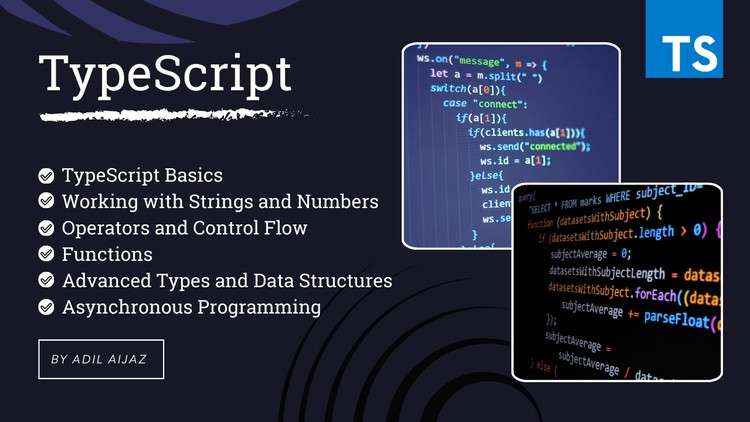
Comprehensive TypeScript Programming Challenge: Test Your Knowledge with Practice Questions
What you will learn
Understand TypeScript Basics: Variables, data types, type inference, and error handling.
Manipulate Strings and Numbers: Perform string operations and manage numerical computations effectively.
Apply Operators and Control Flow: Use assignment, comparison, and logical operators to control program flow with if-else, switch statements, and ternary operato
Develop Functions: Create functions with parameters, return values, default parameters, rest parameters, arrow functions, and understand variable scope.
Explore Advanced Types and Data Structures: Utilize type aliases, type literals, unions, intersections, arrays, tuples, and advanced object manipulation.
Master Asynchronous Programming: Implement async functions, handle promises, use the await keyword, manage async operations, and handle errors effectively.
Why take this course?
This practice test is designed to help you master TypeScript by focusing on key areas of the language through a comprehensive set of questions. It includes six sections, each targeting crucial aspects of TypeScript development:
Note➛ Make sure your 𝐔𝐝𝐞𝐦𝐲 cart has only this course you're going to enroll it now, Remove all other courses from the 𝐔𝐝𝐞𝐦𝐲 cart before Enrolling!
- TypeScript Basics: Get familiar with fundamental concepts such as variables, data types, type inference, and common errors. You’ll practice identifying syntax, type, and assignability errors, as well as understanding the significance of const and let.
- Working with Strings and Numbers: Practice manipulating strings and numbers, using template literals, and performing arithmetic operations. This section also covers string concatenation, and working with various operators to handle numeric computations effectively.
- Operators and Control Flow: Test your knowledge of assignment, comparison, and logical operators. You’ll also explore control flow mechanisms, including if-else statements, ternary operators, and switch statements, ensuring you can make decisions and handle different scenarios in your code.
- Functions: Understand different types of functions, parameters, and return values. This section covers default and rest parameters, the spread operator, arrow functions, and scope (global and local variables). You’ll also delve into advanced concepts like recursion, Immediately Invoked Function Expressions (IIFE), anonymous functions, nested functions, and callbacks.
- Advanced Types and Data Structures: Explore advanced topics such as type aliases, literals, unions, and intersections. You’ll also work with arrays, including their properties and methods, multidimensional arrays, objects, and tuples. This section will help you manage complex data structures and leverage TypeScript’s powerful typing system.
- Asynchronous Programming: Practice working with async functions, promises, and the await keyword. You’ll learn to handle asynchronous operations effectively, manage parallel tasks with Promise.all, and handle errors using try-catch blocks. This section ensures you can write efficient, non-blocking code for real-world applications.
These sections will help you reinforce your TypeScript skills through a variety of question types, including multiple-choice, multiple-selection, true/false, and coding-based questions. Each question is designed to challenge your understanding and application of TypeScript concepts, ensuring you gain confidence and proficiency in the language.
English
language
Found It Free? Share It Fast!